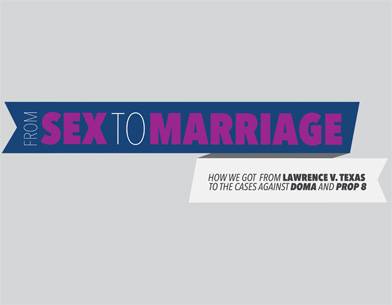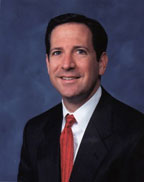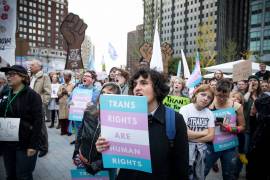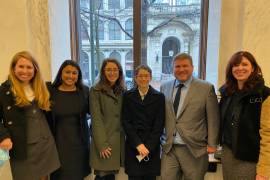
From Sex to Marriage: The Phone Call That Set a Landmark Case in Motion
Blog Search
In the blog series From Sex to Marriage: How We Got From Lawrence v. Texas to the Cases Against DOMA and Prop 8, we ask key players in Lambda Legal’s biggest victory to discuss the importance of the landmark case, and its impact on the marriage cases currently before the Supreme Court.
Read Executive Director Kevin M. Cathcart’s introduction here.
In this first installment, Lambda Legal talks to Mitchell Katine, an attorney in private practice who received the phone call that set the Lawrence case in motion. Katine is a founding partner with the law firm of Katine & Nechman in Houston.
Lambda Legal: What do you remember about that first phone call in the Lawrence case?
Mitchell Katine: I was first contacted by (LGBT rights advocate) Lane Lewis, who told me that two men had been arrested in John Lawrence’s home for engaging in consensual sex. The arrest was based upon Texas Penal Code Statute 21.06. Having never before heard of anyone being arrested for having consensual sex, my initial though was they had to have committed some other offense, such as public intoxication, drug use, resisting arrest, public indecency or some other common criminal offense. So I requested that Lane fax me the arresting documents to verify what he believed was true.LL: How and why did you ask Lambda Legal to become involved?
MK: After I received the criminal complaint and arresting documents, I realized that this case involved more than a simple criminal defense. I realized from the beginning that the unique nature of the arrest—and the sole charge of violating the Texas Homosexual Conduct Statute—must involve constitutional implications.
As a lawyer in private practice, I don’t often handle constitutional claims. The closest I had come to fighting for the civil rights of gay and lesbian individuals was in the context of handling HIV employment discrimination cases.
A few months prior to John Lawrence and Tyron Garner being arrested, I attended a Creating Change conference in Dallas, where I met Suzanne Goldberg, who was an attorney with Lambda Legal. I found her to be extremely intelligent, knowledgeable on constitutional law issues and an overall nice person. After the conference, we continued to communicate on various HIV discrimination matters. I felt confident that she had the expertise to make sure that John Lawrence and Tyron Garner received the representation that they needed.
I also realized early on that defending John Lawrence and Tyron Garner on constitutional grounds would require extensive work and expense. I was aware that Lambda Legal was a well-established and successful civil rights organization that had the resources to take the lead in this case.
Next: Ruth Harlow, former Legal Director for Lambda Legal, explains our strategy on the Lawrence case.





